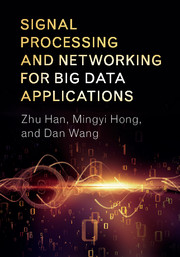Book contents
- Frontmatter
- Dedication
- Contents
- Part I Overview of Big Data Applications page
- Part II Methodology and Mathematical Background
- Part III Big Data Applications
- 8 Compressive Sensing-Based Big Data Analysis
- 9 Distributed Large-Scale Optimization
- 10 Optimization of Finite Sums
- 11 Big Data Optimization for Communication Networks
- 12 Big Data Optimization for Smart Grid Systems
- 13 Processing Large Data Sets in MapReduce
- 14 Massive Data Collection Using Wireless Sensor Networks
- Bibliography
- Index
9 - Distributed Large-Scale Optimization
from Part III - Big Data Applications
Published online by Cambridge University Press: 18 May 2017
- Frontmatter
- Dedication
- Contents
- Part I Overview of Big Data Applications page
- Part II Methodology and Mathematical Background
- Part III Big Data Applications
- 8 Compressive Sensing-Based Big Data Analysis
- 9 Distributed Large-Scale Optimization
- 10 Optimization of Finite Sums
- 11 Big Data Optimization for Communication Networks
- 12 Big Data Optimization for Smart Grid Systems
- 13 Processing Large Data Sets in MapReduce
- 14 Massive Data Collection Using Wireless Sensor Networks
- Bibliography
- Index
Summary
In this chapter, we discuss distributed algorithms for solving large-scale optimization problems over networks. In particular, the optimization problem is defined over a network of nodes/agents where each of them may have a piece of data, or may be in charge of updating a subset of variables, and they are required to collaboratively perform the desired optimization. The key question to be addressed is, under various problem settings, what protocols should the agents follow so as to efficiently optimize the overall problem. These types of distributed optimizing algorithms have recently become increasingly important in various big data problems, with applications ranging from distributed machine learning, signal processing, networking, multi-agent systems, parallel optimization, etc. There are a few driving forces behind these new trends, as we briefly list below:
1. The advances in sensor technologies makes distributed data acquisition ubiquitous.
2. The increasing size of optimization problems in big data era calls for distributed data storage.
3. Privacy issues in big data problem prevents direct data exchange among different (possibly geographically distributed) data sources.
4. Using multi-core high-performance computing systems (with either shared or distributed memory) to solve big data optimization problems can significantly reduce the solution time.
In this chapter, we present a few recent algorithms for solving such distributed optimization problems. We will cover a wide range of algorithms and discuss their convergence behavior, as well as their performance in terms of scaling with network/problem sizes.
The chapter is organized as follows. In Sections 9.1–9.4, we present a general problem formulation and a few popular first-order methods. In Section 9.5, we discuss a special cases of the general formulation (i.e., the global consensus problem). In Section 9.6, we compare various algorithms presented in this chapter.
Background
Problem Formulation
The Optimization Problem
Consider a network with N distributed agents, each capable of communicating with its immediate neighbors; see Figure 9.1 for an illustration.
- Type
- Chapter
- Information
- Signal Processing and Networking for Big Data Applications , pp. 196 - 224Publisher: Cambridge University PressPrint publication year: 2017



